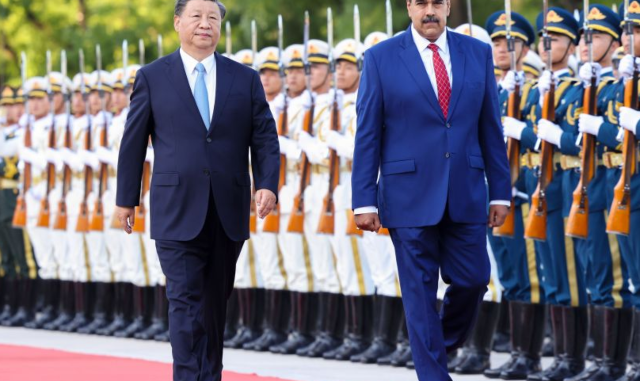
Published August 23, 2025
The waters off Venezuela have become the stage for a new test of global power. As the United States deploys warships in a counternarcotics mission against the Maduro regime, China has stepped in with sharp diplomatic resistance, warning Washington against “threats of force” and interference. The standoff marks more than a crackdown on cartels—it highlights the widening fault lines of U.S.–China rivalry in Latin America.
Background
For years, Washington has accused Nicolás Maduro and top Venezuelan officials of running the Cartel de los Soles, a major cocaine-trafficking network. The Trump administration has raised the stakes, sending three Aegis-class destroyers and thousands of sailors and Marines to the Caribbean. Officials claim the mission is aimed at cutting off drug routes that feed America’s addiction crisis.
But to China, Venezuela’s primary economic and diplomatic partner, this military show of force is a violation of sovereignty and a dangerous escalation in the hemisphere.
China’s Position
Chinese Foreign Ministry spokesperson Mao Ning condemned the naval deployment, stressing Beijing’s opposition to the use—or threat—of force in foreign affairs. China’s ambassador in Caracas, Lan Hu, reinforced support for Maduro at the Miraflores Palace, highlighting cooperation in technology, energy, and artificial intelligence.
China has already invested over $67 billion in Venezuela since 2007, ignoring sanctions and continuing to buy its oil, often disguised through “shadow fleets.” For Beijing, defending Caracas means not only preserving its investments but also asserting influence in a region Washington once dominated unchallenged.
U.S. Actions
White House Press Secretary Karoline Leavitt and Secretary of State Marco Rubio framed the naval mission as a counternarcotics operation, calling Maduro a criminal leader indicted for drug trafficking. The U.S. is offering $50 million for his arrest.
By deploying warships near Venezuela, Washington aims to cut off smuggling routes, pressure the Maduro regime, and show Latin America that the U.S. remains committed to security in the hemisphere.
Venezuela’s Response
Maduro has responded with defiance, calling the naval deployment an imperialist provocation. He announced the mobilization of 4.5 million reservists and militia members, releasing footage of civilians in combat drills.
Interior Minister Diosdado Cabello—wanted by the U.S. with a $25 million bounty—appeared in propaganda videos fumbling with rifles, symbolizing the regime’s reliance on mass mobilization and nationalistic fervor rather than modern firepower.
 Resulting Effects:
Resulting Effects:
-
Strengthened Sino-Venezuelan Ties
-
U.S. naval pressure risks reinforcing Nicolás Maduro’s dependence on Beijing for political legitimacy, economic aid, and even security partnerships.
-
-
Erosion of U.S. Influence in Latin America
-
China’s willingness to openly challenge Washington in the Caribbean could embolden other regional governments to lean on Beijing as a counterweight to U.S. dominance.
-
-
Increased Risk of Regional Militarization
-
The presence of U.S. destroyers near Venezuela, combined with Venezuela’s militia mobilization and China’s backing, raises the likelihood of accidents, escalations, or proxy confrontations in the region.
-
-
Shift in Global Drug War Narrative
-
By framing U.S. counternarcotics missions as “imperial aggression,” China and Venezuela may successfully recast America’s drug-war campaign as political interference, complicating U.S. legitimacy in international forums.
-
-
New Template for Chinese Diplomacy
-
Beijing’s sharp response signals that it is prepared to use diplomatic power abroad to defend its partners—even outside Asia—setting a precedent for future disputes in regions historically dominated by the U.S.
-
 Bottom Line:
Bottom Line:
The confrontation over Venezuela reveals much more than a counternarcotics mission—it highlights the widening fault lines of a new global rivalry. Washington’s deployment of warships to the Caribbean underscores its resolve to target drug cartels and pressure Nicolás Maduro’s regime. Yet Beijing’s swift diplomatic defense of Caracas shows that China is no longer content to remain a distant observer in Latin America.
Instead, the crisis illustrates how U.S. military assertiveness can drive smaller states into China’s embrace, deepening geopolitical realignments across the Western Hemisphere. Venezuela, once isolated by international sanctions, now finds itself shielded by China’s financial and diplomatic backing.
What emerges is a testing ground: the Caribbean becomes not just a battleground for narcotics enforcement, but a symbolic arena where U.S. power projection meets China’s rising global influence. The outcome may well shape future alignments in Latin America and determine whether Washington can maintain its traditional dominance—or if Beijing’s presence will steadily erode it.





Be the first to comment